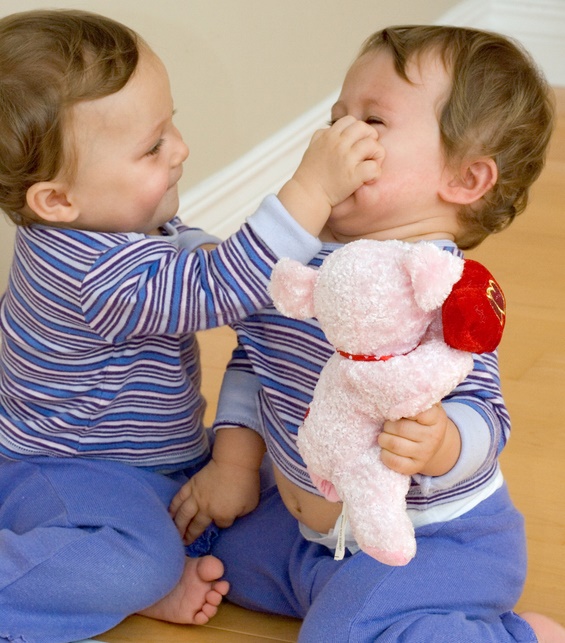
When does biting, tantrum-throwing and other unpleasant behaviour begin – and what can you do about it?
As parents, we all want our children to be little angels, at least in public. And when your newborn arrives, this at first is exactly what you’ve got, at least most of the time – a little angel that friends and strangers alike coo and smile over.
And then your precious little angel gets a mind of her own and discovers a measure of independence. All of a sudden, life is less easy because she realises that she’s not completely joined to you at the hip. When she doesn’t get her own way, you might find yourself facing unpleasant behaviour like biting, hitting, pinching and tantrum-throwing, both at home and when you’re out and about.
Aggression in your toddler is a normal developmental stage and she should grow out of it in time. But she needs to know that these types of behaviour are wrong. So when do these nasty tendencies start, and how should you deal with them?
Biting
- Why it starts: To get attention, or her own way. Your baby isn’t old enough to express herself rationally, so she is trying other ways.
- When it starts: Biting is common between the ages of 1 and 3, when your baby is most likely to start learning to socialise with other little ones. She could also, of course, decide to bite you. At this stage, she doesn’t have the skills or language abilities to deal with confrontation in any other way.
- What to do: Timeout is a good way to teach your baby that biting is wrong. Remove her from the situation to show her that the behaviour won’t be accepted and that there are consequences to her actions. If, of course, you have a 1-year-old who is biting you gently to show you that she’s hungry, then feed her!
Hitting and pinching
- Why it starts: This behaviour tends to start as your newly-mobile baby starts to want to do things she’s just not big enough or coordinated enough for, and becomes intensely frustrated.
- When it starts: Somewhere between the age of 1 and 2.
- What to do: Immediately place your baby so she’s facing something boring. Kneel behind her, holding her hands at her sides and say repeatedly, “We don’t hit or pinch” (and this strategy works for biting, too.) Most babies will stand still for a short while to see what the game is and will then get upset when they realise it’s not a game. After about 10 seconds of your baby being upset, let go. Follow up with approving attention as soon as your baby starts doing something acceptable. Repeat this every time she begins an aggressive act.
Whining
- Why it starts: An annoying, prolonged whining session gets your attention and can wear you into submission. Your toddler learns that it can sometimes get her what she wants.
- When it starts: Whining happens in older, verbal toddlers who are talking nicely. It’s more likely to happen if your toddler is hungry, tired or frustrated, and whenever she wants some attention or her own way.
- What to do: Try to ignore it and don’t give in to your toddler’s demands. Try to distract her instead (see below). Try to monitor how she’s feeling physically – a tired, hungry toddler is much more likely to be difficult.
Defiance
- Why it starts: Your toddler has discovered her independence and with it the word “no!” She’s realised that she can have an impact on the world and she’s testing this as much as possible.
- When it starts: Defiant behaviour tends to start around the age of 2, when your toddler starts to become more self-aware. It’s a normal stage of development and should be over by the time she’s 4.
- What to do: Try to give your toddler instructions that are difficult to say no to. Give her choices instead, so that she feels like she has some control. Instead of asking her: “Do you want some breakfast?”, try saying: “What do you want for breakfast? Toast and cheese or toast and egg?”
Tantrums
- Why it starts: She sees it, she wants it and she can’t have it! Being a toddler and having to obey rules you don’t always understand can be really frustrating – not to mention the frustration of not being quite big or coordinated enough to do the things you want to do.
- When it starts: They talk about the “terrible twos”, but actually tantrums can start as early as at the age of 1 and continue till about 3.
- What to do: Try to ignore a tantrum, and if this is impossible, take your toddler out of the situation, even if it means leaving a shopping trolley behind! Stay calm and try not to raise your voice. When she’s finished her tantrum, gently and firmly tell her you understand how she feels, but explain why she can’t get her own way.
Breath-holding
- Why it starts: To get attention or her own way.
- When it starts: This might happen at first inadvertently during a tantrum. After this, your toddler may realise that it got her attention and she might try it again.
- What to do: Don’t let her breath-holding make you give in to her desires! Deal with it in the same way you’d deal with a tantrum. Stay calm, and again, let her know you understand how she feels, but explain why she can’t get her own way.
15 of the worst...
How does your toddler press your buttons? Do any of these sound familiar?
- Throwing a screaming tantrum in the supermarket
- Walking or running away from you
- Interrupting you while you’re on the phone or working at the computer
- Biting, hitting, kicking or grabbing
- Whining in general
- Whining to watch TV all the time
- Not listening to you or blatantly ignoring you
- Being defiant with her words or expressions
- Laughing at you if you’re telling her off
- Arguing with you and yelling at you
- Taking her little brother’s toys away from him just to be mean
- Refusing to greet you when you’ve come home
- Picking her nose
- Being delightful to everyone except you
- Refusing to eat the good food you lovingly prepared, then asking for chocolate.
Ten top tips for better behaviour
- Distract her. Stop a tantrum before it really takes off by distracting your toddler. “Oh look!” you say, “There’s an aeroplane, orange bus, red taxi or purple dog. Oh, the purple dog’s gone now but look, there’s a black one!”
- Offer choices. Tell your baby: “When this Noddy episode is finished, it’s bathtime. Which toy do you want to play with in the bath – your boat or the little bucket and spoon?”
- Praise good behaviour. Sometimes, starting a tantrum or other bad behaviour is about trying to get your attention. So when she’s been good, make a point of noticing and praise her for it.
- Don’t say “no” all the time. Make your home as toddler-friendly as you can. Remove that tempting yet fragile ornament that she’s always trying to pick up when you aren’t looking. You can also turn a “no” into a “yes”. For example, instead of “No, you can’t have a biscuit now”, say: “Yes, you can have a biscuit later, after lunch.”
- Lower your expectations. She’s still learning about her world. Is it fair to expect a 2-year-old who’s just learning to eat not to make a mess on the table or floor.
- Ignore sibling squabbles unless the thump was extra loud and the scream that followed... If you do have to intervene, try to do it decisively and without taking sides.
- Be fair. If you have a toddler and a younger baby, you’ll probably find yourself being harder on your toddler than you used to be. Even things out by letting your toddler sometimes hear you say, “Now, baba, I’m changing your nappy so stop wriggling and lie nice and still like your big sister does.” Your baby won’t mind, and your toddler will feel that life is fairer.
- Laugh about it. This too shall pass. Everything does! Turn the simultaneous destruction of your best red lipstick and the newly-painted passage wall into a story to tell your friends.
- Turn a blind eye. If you know for a fact that your baby is just trying to get a reaction out of you and it’s something you can live with for a while, pretend to ignore her or even walk out of the room. Turning a blind eye to provocative behaviour can sometimes make it disappear
- Get down to her level and have some fun together. Take some time to run around the garden with her or water the plants together. Do something you both like to do that makes you both feel good.
Resources:
Your Baby & Child, Penelope Leach, Penguin




 Publications
Publications
 Partners
Partners










